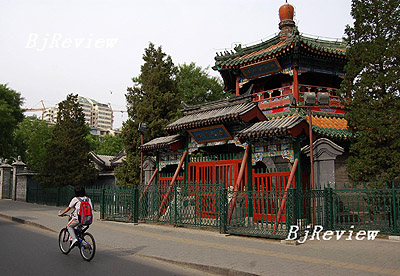 |
|
MIX OF CULTURES: Located in Xuanwu District, an area of Beijing with a large Muslim population, the Niujie Mosque encompasses both ancient Chinese and Arabian architectural styles, and is the oldest and most famous Muslim place of worship in Beijing (JING XIAOLEI) |
She sat in a coffee shop, with dyed brown hair, speaking fluent putonghua. "Quite often people think I'm from mixed blood," said Guli, 27, a Uygur girl who was born and grew up in Kuqa County, Xinjiang Uygur Autonomous Region, an area inhabited by ethnic minorities with Uygur being the largest.
Guli has been a mathematics teacher for three years at Beijing Hui School, which has many students from ethnic minority backgrounds." My father always told us that if we wanted to have a better career in the future we'd better learn Chinese well, so he sent all his six children to Han language schools," said Guli, who has three sisters and two younger brothers. Han language schools refer to schools in predominantly ethnic minority areas where classes are taught in putonghua rather than in a local ethnic language.
Her father works as a financial manager in a local oil company. He came to realize the importance of learning Chinese during the 1970s when he was required to write receipts not only in Uygur but also in Chinese.
Guli attended Han language primary and middle schools that were mostly attended by Han Chinese students and were twice as expensive as ethnic minority schools in the area. Benefiting from the country's preferential policy for ethnic-minority students, who can be awarded 10 to 20 points on their grades for the college entrance examination, Guli ended up in Northeast Normal University in Changchun, Jilin Province, though she had wanted to go to college in the country's alluring capital, Beijing.
College life was good for her. She lived in a dormitory with several Han girls and made good friends with them. Her new friends were considerate and thoughtful of her culture. When they went out to a restaurant they respected her Muslim traditions and were careful about choosing a place to eat.
Despite their welcome, being from an ethnic minority in a Han-people dominated city sometimes did bother Guli a little, particularly because of her slightly foreign appearance. "I hate to be stared at when I'm riding a bus or shopping in a supermarket," she said, admitting that she would yell out in her heart, "Don't look at me like that. I'm a Chinese as you guys are!"
But after a while she became more accustomed to the looks and even began to smile to her curious onlookers. "I'm becoming more tolerant because I know they are good people and they don't mean bad," she said.
"I always feel that we are the ones who live our lives in the chink between two cultures," said Guli, talking about people from ethnic minorities who move away from their region. Having studied away from her hometown, she began to find her outlook on the world different from many other Uygur people. She didn't get along well with Uygur fellows from the fellow-townsmen's association in her university. "It's partly because I'm too independent and I don't like their cliquish behavior, but the most important reason is that I have a Han Chinese boyfriend," she explained.
According to her, the Koran bans marriage between Muslim women and non-Muslim men. She's been in love with her boyfriend for seven years but she knows there is little chance of them getting married.
"My boyfriend's parents like me and are very kind to me, but my family opposes our marriage," she said, with a hint of frustration flashing in her eyes.
"I pray to Allah and seek for peace from him when I'm feeling lonely or depressed," she added, admitting that she's not a strict Muslim and seldom goes to Mosque to worship. "Religion is something all about heart and soul, and I'm sure Allah is always there for me when I need help."
Despite her problems Guli is satisfied with her current life in the country's capital. "I have a decent job, make a good salary and have respect from my students and their parents. I like my life here in Beijing."
Talking about the future, she said she has long wanted to own a flower shop. "I'm a romantic type of person. I'd prefer to open my flower shop in a small city by the sea, where life is quiet and simple," said the Uygur girl, painting a beautiful future scenario, just like a million other dreamy girls on the planet. | 